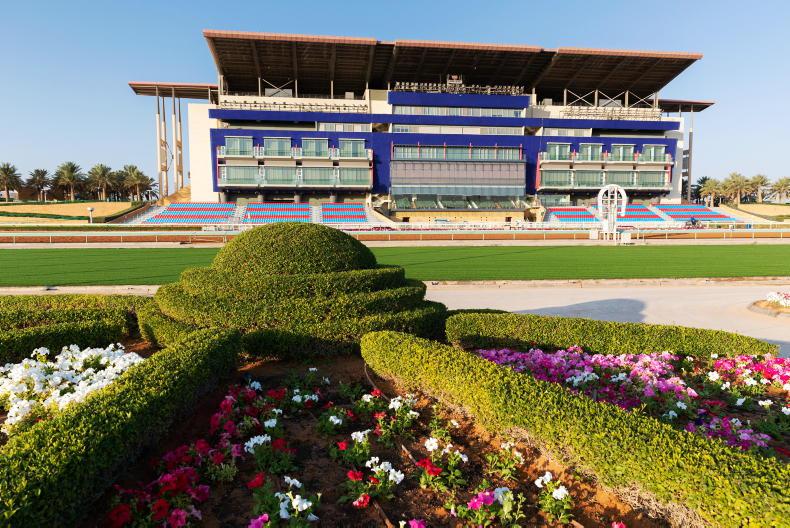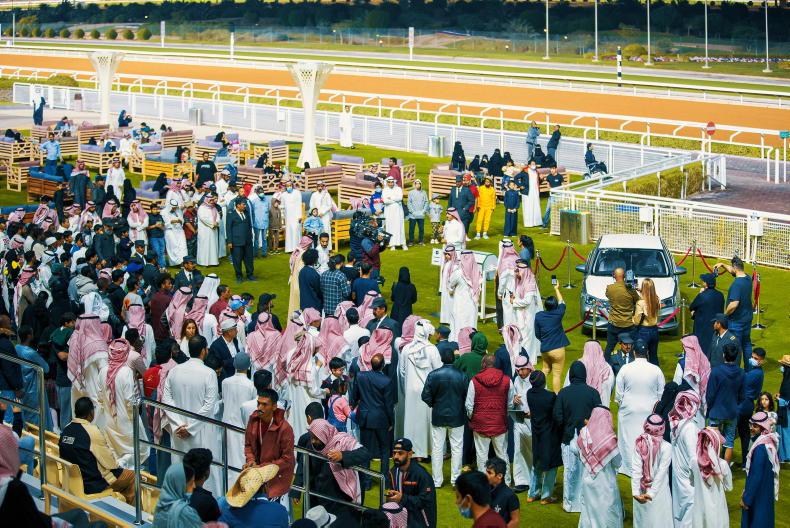EMER Fallon is currently the director of racing services for the Saudi Cup, a race that is the richest in the world with prize money of €20 million.
It is safe to say that horses have always been part of Emer’s life when growing up.
“Horses have always played a big part in our family. My father had National Hunt horses when I was growing up and so I got into racing from an early age,” she recalls.
“I started riding when I was a child and then progressed to riding racehorses as a teenager. I rode out my first racehorse at Tom Foley’s yard and was immediately hooked.
“I went on to study Equine Science, did a stint at Ballydoyle as a work rider, and another at Newtown Stud where I participated in the yearling/foal preparation before moving on to the Irish Turf Club.”
Working for Godolphin
Fallon has also worked for Godolphin, one of the world’s most famous breeding and racing operations. She worked as a racing secretary for the operation in Dubai and UK from 2010 to 2018.
“It was a remarkably busy time; we were based in Newmarket in the summer and Dubai in the winter,” she recalls. “I worked as Saeed Bin Suroor’s racing secretary. His main winter targets were the Dubai World Cup Carnival, onto the Dubai World Cup, and then straight back to England for the Guineas, followed by a full season of racing in Europe before concentrating on the events at the backend of the season – Breeders Cup, Hong Kong Internationals, and the Melbourne Cup.”
International racing
The job was continuous, and Fallon found out more about international racing and what is involved with it. Fallon also explains the difference between UAE racing and British and Irish racing by saying: “It is obviously a much shorter season, there is dirt racing of course, a beautiful winter climate and therefore quite consistent turf conditions.
“There is domestic racing in Sharjah, Abu Dhabi, Al Ain, Meydan and Jebel Ali from October through to March.
“They have more pure-bred Arabian racing and the ownership in the UAE is not as diverse as it would be back in Europe, although that has changed in recent years with the introduction of the Racing in Dubai Sale, which encourages new owners, including ex-pats, to get a foothold in the sport.”
The role with the Saudi Cup
The Saudi Cup has a big Irish influence with some of the most important positions such as organising the event, are held by Irish people. Fallon is Director of Racing services for the Saudi Cup.
Her job involves being part of the selection panel, a role that involves tracking horses from all over the world from USA to Japan, UAE, and Europe.
“From mid-summer onwards we start targeting horses, having initial conversations with connections, and placing adverts in publications to ensure that the Saudi Cup remains at the forefront of their minds,” she explains.
“Once the entries come out, we start inviting horses and that doesn’t stop until a couple of weeks before race day as we keep an eye on the DWCC.”
Another part of Emer’s job involves organising the International Jockeys Challenge and overseeing of the horse connections liaison. This involves looking after the trainers, jockeys, and owners, making sure that enjoy their time.
“It is a very varied role that has evolved for me, and it now involves more of the domestic racing, as well as the development of the yearling auction here in December. It is a job that always keeps me on my toes.”
Asking Emer about the potential of the Saudi Cup and how big the race could be in five to 10 years’ time she said: “I would like to see it as a well-established part of the global racing calendar that becomes a firm fixture in owners’ and trainers’ diaries.
“Our undercard is making huge progress and I would hope that there would be multiple Group 1 races within it by then. Right now, we have five Group 3s which may be upgraded again following this year’s renewal. And I would also hope that it is more than just prize money that will attract horses, that the races will also hold value in terms of form; I would hope that in time the Saudi Cup itself becomes a stallion making race.”
A special race
Already in its third year, the Saudi Cup has become a lucrative race for trainers, owners, jockeys, and breeding operations alike.
The race’s ascent has been meteoric, and in the coming years, the event will continue to go from strength to strength.
Fallon continued: “Other than being the world’s most valuable race at $20 million, it was elevated to Group 1 status after only its second running, and that says a lot. It is not only a testament to the quality of the horses that compete, but also to the track and the facilities.
“They would not come for any money unless we were able to provide top-class facilities. In fact, the track is renowned for being one of the best dirt tracks in the world and it is one of the few that attracts dirt, as well as turf horses.
“This means we will hopefully continue to get a cross-section of the world’s best horses over that distance. That is pretty special.”
Favourite horses
Asking her about who was her favourite horse, in National Hunt racing, Emer picks Istabraq, the three-time Champion Hurdle winner at the Cheltenham Festival.
“I have never seen a horse jump a hurdle like him before or since.”
On the flat, her favourite horse was Galileo, the 2001 Derby and Irish Derby winner who had a hugely successful career in producing champions at stud.
She “will never forget that epic battle” Galileo had with Fantastic Light up the straight at Leopardstown.
“That will always stand out in my mind. He just had it all.”
Changes
When discussing what changes would be good for racing and how the sport can be better, Fallon mentions that a worldwide harmonisation in the sport would be great to see.
“A more standardised approach globally in terms of regulation, medication, welfare and an easing of protocols to allow horses to travel more easily to compete internationally.”
Fallon is enjoying working out in the Middle East, but she did not rule out moving back to Ireland to work in racing full time.
On this topic, she said: “At the moment this job allows me to be based in Ireland for most of the summer. I will always be open to considering a position in my home country when the time comes.”


 This is a subscriber-only article
This is a subscriber-only article
 It looks like you're browsing in private mode
It looks like you're browsing in private mode






SHARING OPTIONS: